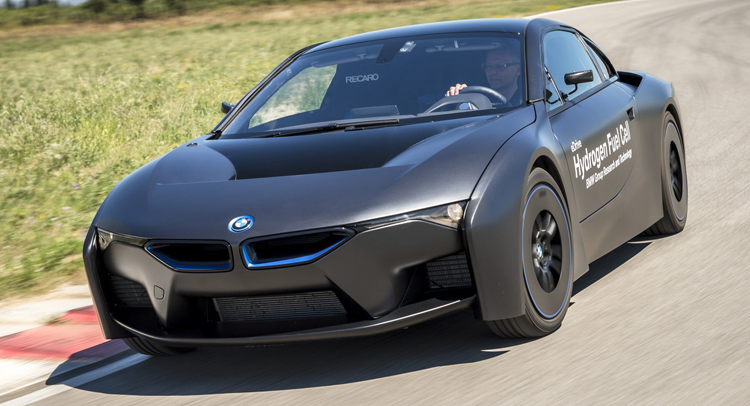Alongside a 2-Series Active Tourer Plug-In Hybrid prototype which we’ll cover shortly, BMW has presented i8 and 5-Series GT prototypes with hydrogen fuel cell powertrains, as well as a 1-Series prototype fitted with Direct Water Injection technology.
As one of the pioneers of hydrogen-powered cars, BMW continues to research ways to make this alternative fuel viable for everyday use. Like other manufacturers, BMW is now focusing on hydrogen fuel cell technology rather than on vehicles that burn hydrogen inside the engine. The automaker plans to bring a Fuel Cell Electric Vehicle (FCEV) to market by 2020 and is using the technology partnership with Toyota to speed up the process.
BMW has presented two prototypes fitted with the technology, one based on the i8 and another using the 5-Series GT as a starting point. While no details were offered about the i8 prototype, BMW said the 5-Series GT fuel cell car is powered by an electric motor producing 180kW (245PS) which sources energy from a fuel cell stack developed together with Toyota. There’s also a high-voltage battery for interim energy storage and power electronics.
Hydrogen is stored in a tunnel tank between the front and rear axle which features industry standard 700 bar CGH2 vessel technology and cryogenic pressure vessel technology (CCH2) patented by the BMW Group for storing gaseous hydrogen at low temperature and 350 bar pressure.
The vehicle has an operating range of over 500 km (more than 300 miles), with refueling taking under five minutes. BMW says fuel cell technology “makes an ideal addition to both the BMW i models and, in the future, the series-produced models from the BMW brand fitted with tried-and-tested eDrive technology.”
Finally, BMW has also shown a 1-Series prototype that uses direct water injection technology. Following the debut of water injection in the BMW M4 MotoGP Safety Car, direct water injection for turbocharged petrol engines is showcased on a three-cylinder petrol engine.
Direct water injection has a cooling effect that helps increase performance and efficiency, with fuel consumption being especially reduced when the driver adopts a sportier style. Furthermore, direct water injection reduces thermal stress on numerous engine components and minimizes emissions.
In the BMW 1-Series prototype, direct water injection contributes to a boost of 10 percent in power and torque, as well as up to 8 percent in fuel efficiency.













































































































